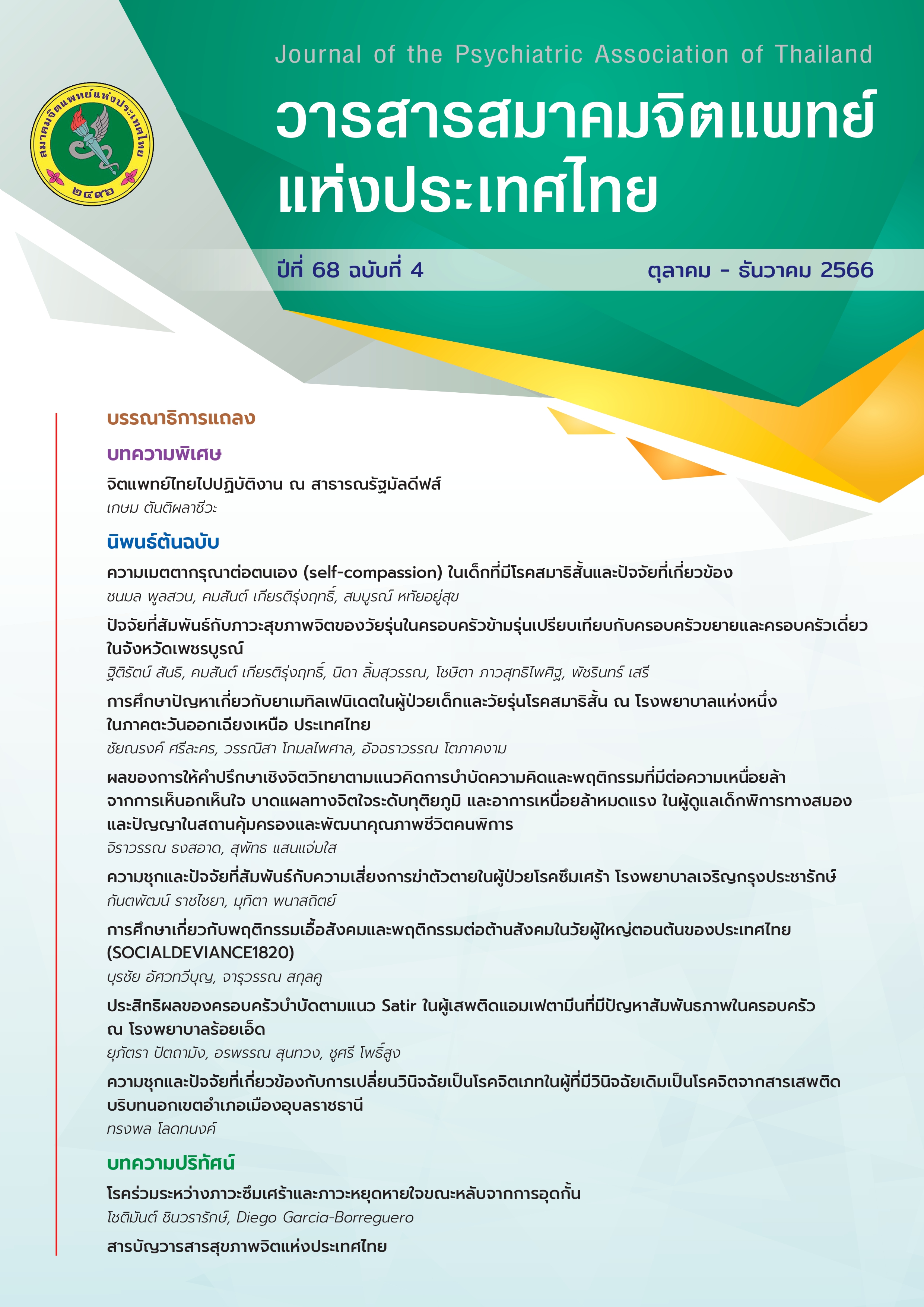The Effects of Cognitive Behavior Counseling Program on Compassion Fatigue, Secondary Trauma and Burnout in Caregivers of Children with Intellectual Disabilities in the Home for Protection and Development for Persons with Disabilities
Main Article Content
Abstract
Objective: To study the effects of cognitive behavior counseling program on compassion fatigue, secondary trauma and burnout in caregivers of children with intellectual disabilities in the Home for Protection and Development for Persons with Disabilities by comparing between the experimental group and the control group.
Methods: The sample group is caregivers of children with intellectual disabilities in the Home for Protection and Development for Persons with Disabilities. 16 caregivers with the lowest scores on the Compassion fatigue measurement were selected and divided equally into the experimental group and the control group, with 8 caregivers per group. The experimental group participated in the Cognitive behavior counseling program for 6 sessions, each session lasting 45 - 75 minutes, once a week. The compassion fatigue measurement was administered before and after the experiment and data was analyzed using the Man-Whitney U test.
Results: Caregivers of children with intellectual disabilities in the Home for Protection and Development for Persons with Disabilities who had participated in the Cognitive behavior counseling program scored lower on compassion fatigue and secondary trauma than caregivers of children with intellectual disabilities who had not participated in the program, at the .05 statistical significance. Caregivers of children with intellectual disabilities in the Home for Protection and Development for Persons with Disabilities who had participated in the program scored lower on Burnout than caregivers of children with intellectual disabilities who had not participated in the program but not at the .05 statistical significance.
Conclusion: Cognitive behavior counseling program can help reduce Compassion Fatigue, Secondary Trauma and Burnout in Caregivers of children with intellectual disabilities in the Home for Protection and Development for Persons with Disabilities.
Article Details

This work is licensed under a Creative Commons Attribution-NonCommercial-NoDerivatives 4.0 International License.
Articles submitted for consideration must not have been previously published or accepted for publication in any other journal, and must not be under review by any other journal.
References
Department of Empowerment of Persons with Disabilities Thailand. Disabled person situation [Internet] 2010-2021 [cited 2021 October 5]. Available form: https://dep.go.th/th/law-academic /knowledge-base/disabled-person-situation
Nittaya N, Boonkorn B, Thongpetch T, Karnchana K. Department of Mental Health reveals more than 1 million Thai people have intellectual disabilities [Internet]. 2018 [cited 2021 November 25]. Available form: https://www.dmh.go.th/news- dmh/view.asp?id=28246
Sriwongpanich N, Wechviroon C, Phosombun W, Thatsinpong C, Chuasuk T, Anpurawatanakit A, Rayan S. Intellectual disabilities [Internet]. 2014 [cited 2021 November 25]. Available form: https://th.rajanukul.go.th/ข้อมูลวิชาการ: กลุ่มโรคสำคัญ/บกพร่องทางสติปัญญา
National Statistical Office of Thailand. Disability Poll Results [Internet]. 2017 [cited 2021 November 25]. Available form: http://www.nso.go.th/sites/2014/DocLib14/News/2561/12-61/N04-12-61-1.pdf
Home for Protection and Development for Persons with Disabilities (Male). Statistics of service recipients and staff rates [Internet]. 2021 [cited 2021 February 17]. Available form: http://www.banrachawadee.com/Content/Structure.aspx
Mahwanukul T. Report of the disabled situation in Thailand [Internet]. 2021 [cited 2021 November 25]. Available form: https://dep.go.th/images/uploads/files/situation_Sep64.pdf
Siriratleka T. Intellectual disabilities [Internet]. 2017 [cited 2021 December 5]. Available form: https://www.happyhomeclinic.com/Download/article/sp05-intellectual-disability.pdf
Raina P, O'Donnell M, Schwellnus H, Rosenbaum P, King G, Brehaut J, et al. Caregiving process and caregiver burden: conceptual models to guide research and practice. BMC Pediatrics 2004; 4(1): 1-13.
Korsuwan K. Intellectual disabilities. 1st ed. Bangkok: Srinakarinwirot University; 2010.
Polkrang P. Health-promoting behavior of child caregivers with developmental delays [dissertation]. Changmai: Changmai University; 2004.
Didden R, Korzilius H, Aperlo B, Overloop C, Vries M. Sleep problems and daytime problem behaviours in children with intellectual disability. Journal of Intellectual J Intellect Disabil Res 2002t;46:537-47.
Danvanich W. Depression and related factors in caregivers of children with intellectual disabilities. [dissertation]. Changmai: Changmai University; 2008.
Pines A, Aronson E. Career Burnout: Causes and Cures. 1st ed. New York: Free Pres; 1988.
Hundall S. Professional quality of life measure: Compassion, satisfaction, and fatigue version 5 (ProQOL) [Internet]. 2009 [cited 2021 November 25]. Available form: https://proqol.org/proqol-measure
Panurach S. Nursing life quality assessment. Songklanagarind Journal of Nursing 2008; 38(1): 129-43.
Figley C. Compassion fatigue: Coping with secondary traumatic stress disorder in those who treat the traumatized. 1st ed. New York: Taylor & Francis Group LLC; 1995.
Tapinta D. Depression: therapy and counseling by adjusting cognitive and behavior. 1st ed. Changmai: Wanida Karnpim; 2020.
Beck A, Rush J, Shaw B, Emery G. Cognitive therapy of depression. New York: Guilford 1979.
Adams E, Figley C, Boscarino A. The compassion fatigue scale: Its use with social workers following urban disaster. Res Soc Work Pract 2008;18(3) :238-50.
Hundall S. Professional quality of life measure: Compassion, satisfaction, and fatigue version 5 (ProQOL) 2009.
Tement S, Zorjan S, Lavric M, Postuvan V, Plohl N. A randomized controlled trial to
improve psychological detachment from work and well-being among employees: a study protocol comparing online CBT-based and mindfulness interventions. BMC Public Health. 2020; 20(1): 1708.
Abolmaali K, Aghaeepour Gavasaraee M. Effectiveness of cognitive-behavioral training on reducing the secondary trauma symptoms of PTSD veterans' wives. Iranian Journal of War and Public Health 2015; 7(2): 57-65.


